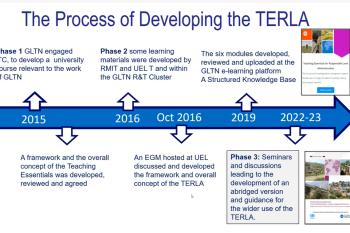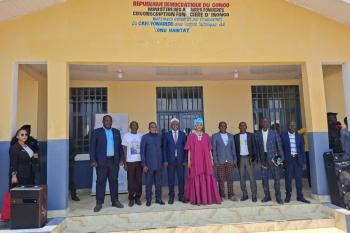
Towards Secure Land Rights for All: Fit-for-Purpose Land Administration Pre-Conference Stakeholder Workshop
Kampala Uganda: From July 28th to 30th, 2025, experts, policymakers, academics and community leaders convened at Fairway Hotel in Kampala for a pre-conference stakeholder workshop on Fit-for-Purpose Land Administration. Hosted by Makerere University-department of Geomatics and Land Administration, the workshop served as a critical precursor to the Joint 8th Advance in Geomatics Research Conference (AGRC) and 14th Eastern African Land Administration Network (EALAN) 2025 Conference.
Supported by UN-Habitat and the Global Land Tool Network (GLTN) under the LAND-at-Scale Uganda project funded by the Netherlands Enterprise Agency, the three-day workshop aimed to increase the understanding and implementation of fit-for-purpose guiding principles, tools and approaches to address Uganda’s land administration challenges. The pre-conference workshop aligned with the main conference’s theme on Geo-enablement for Sustainable Development: Harnessing Innovation in Geomatics and Land Administration.
The workshop started with a focus on the need for land tenure security due to the population growth and increasing pressure on land resources. Professor Musinguzi Moses of Makerere University outlined the Country’s Implementation Strategy for Fit-for-purpose Land Administration, a pragmatic approach that emphasizes affordable, scalable and community driven solutions. The strategy purpose is to improve the existing approaches to land administration by proposing low-cost but appropriate approaches and actions for land administration that will result in tenure security for all land rights holders in Uganda.
Simon Peter Mwesigye, the project coordinator for the LAND-at-scale Uganda project, delivered a keynote presentation on the Global Context of FFP land administration. In a panel discussion, he also addressed the success factors and risks of funding FFP-based land programs in fragile and post-conflict environments. Highlighting the importance of secure land rights in preventing displacement and conflict. He also pointed to the need for transparency, inclusivity, and capacity development to ensure the success and legitimacy of land administration interventions. Furthermore, Mwesigye discussed the potential for alternative financing mechanisms beyond traditional donors, such as development banks, to support these crucial programs.
Discussions highlighted that conventional land administration systems and approaches are often slow and expensive to meet the needs of most Ugandans, particularly those in customary land tenure. The FFP-LA approach has been successfully implemented in several developing countries including Rwanda, Ethiopia and Uganda, and offers a path to secure land rights for all including for women and vulnerable groups like indigenous communities, youth, urban and rural poor, widows and elderly.
Panelists emphasized the need of legal and institutional reforms in Uganda to support FFP-LA like revising the outdated laws such as the Survey Act and the Registration of Titles Act to be accommodative of FFP land registration approaches and methods. Ms Naome Kabanda, Acting Director of Land Management in the Ministry of Lands, Housing and Urban Development spoke on the policy implications, highlighting the need for a simplified legal framework and massive sensitization.
Focus was placed on community participation and gender-responsive land administration. The paramount chief of the Madi, His Royal Highness Simon Surubaru highlighted the key role of traditional institutions in mediating land disputes and preserving customary norms during land registration processes. Civil society organisations are essential in mobilizing communities and ensuring land rights of women, youth and other vulnerable groups are secure. The panellist discussed the challenges of overcoming barriers that prevent women from exercising their land rights and the importance of implementing gender transformative approaches in land governance interventions.


